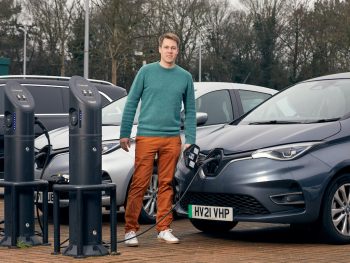Electric cars can’t get tax breaks forever – but 2025 is too soon to slow up
By Thom Groot, co-founder and CEO of The Electric Car Scheme

The Electric Car Scheme CEO and co-founder Thom Groot
When the Chancellor started to talk about electric car incentives during his Autumn Statement yesterday, I was relieved.
Drivers have been in limbo for a while now, waiting to find out whether favourable tax settings for electric cars will survive. The low company car tax rate – just 2% – was due to expire in early 2025, which might seem like a while away, but really isn’t given most car leases are signed for three- or four-year terms.
That cliff edge was worrying – the equivalent petrol and diesel company car tax rate is about 10 times higher – and I didn’t really have a good answer for potential customers who worried about a tax hike come 2025.
Now we have certainty. The rate will not stay at 2% past 2025 – but it won’t rocket up either, instead lifting by 1% every year for three years, ending up at 5% in 2028. That’s still a serious tax advantage for cleaner cars, just not one that’s as good as it is now.
This clarity is refreshing. But really, increasing the tax itself doesn’t make all that much sense.
Obviously, the Government was looking for places to make some savings. But the changes won’t bring in all that much money – the projections are when the rate hits 5% in 2027-28 this will add £245m to the Government’s coffers. A lot of money for you and me, but not for a government projected to be taking in just over a trillion pounds in taxes that year. Indeed – it’s just 0.02% of that projected tax take.
When you compare that cost to the massive problem of climate change, it starts to seem a bit misguided.
The forecasts assume quite a bit of a pickup in electric cars, which is good, because we desperately need to keep the pace up.
Just 1% of the total car fleet is fully electric. Sales are not exactly overtaking fossil fuel cars yet either. In October just 15% of new cars sold in the UK were fully electric, meaning new fossil fuel cars are outselling them six to one. It’s also a step back compared to this time last year. Those polluting cars will be on the roads for years.
Removing incentives – even slowly – does not make sense in this environment, when the benefits of wider electrification are so strong. You don’t even have to care about climate change – electric cars also reduce our reliance on a volatile oil market and produce no pollution, meaning clearer skies and healthier lungs for everyone.
As everyone in the fleet business knows, the cars that companies buy are the ones that consumers often buy second-hand eventually. A strong company car market of electric cars means a strong second-hand market for electric cars in a few years’ time – which is exactly what we need to help the whole country affordably make the shift.
This doesn’t mean the company car rate should stay at 2% forever. But pushing the boat out a bit makes sense while we are still trying to win over those used to fossil fuel cars. Germany has seen the wisdom in this, pledging that their similar tax incentive will stay in place until 2030. I’d like to see our rate frozen for even longer – perhaps 2035, when new fossil fuel car sales will be banned.
Of course, company car tax rates aren’t the only thing rising – electric cars will also pay a Vehicle Excise Duty for the first time from 2025.
On this one, I can see some merit in the Government’s position. While I don’t think reducing incentives is a good idea, I do believe electric car users have to contribute to upkeep of the roads we all drive on.












